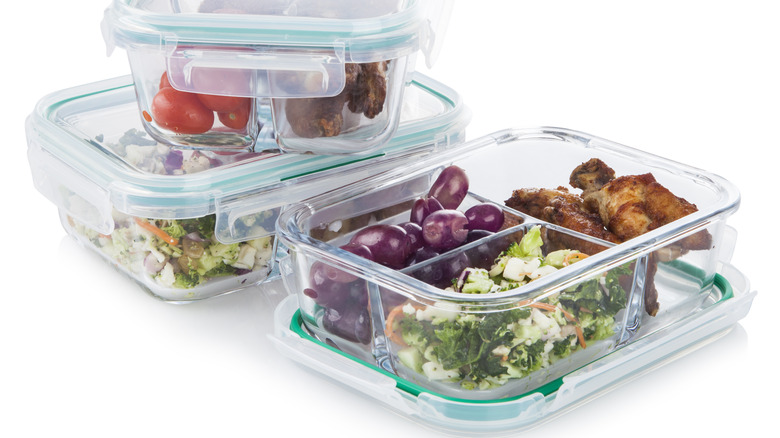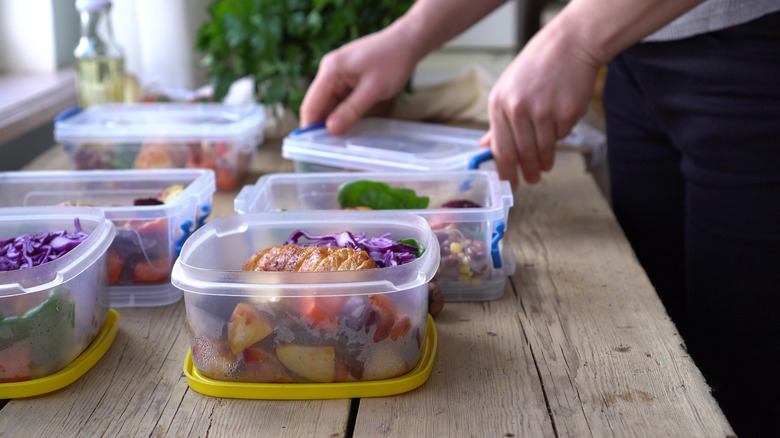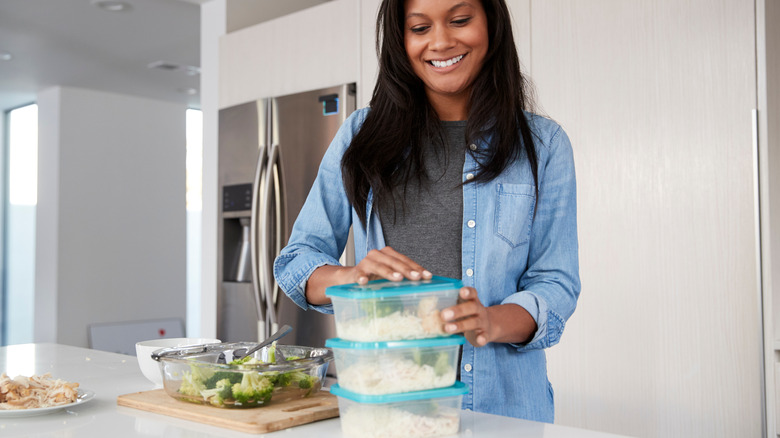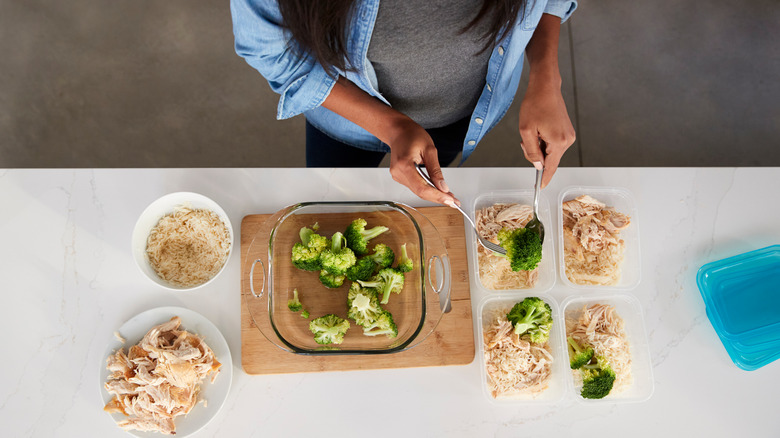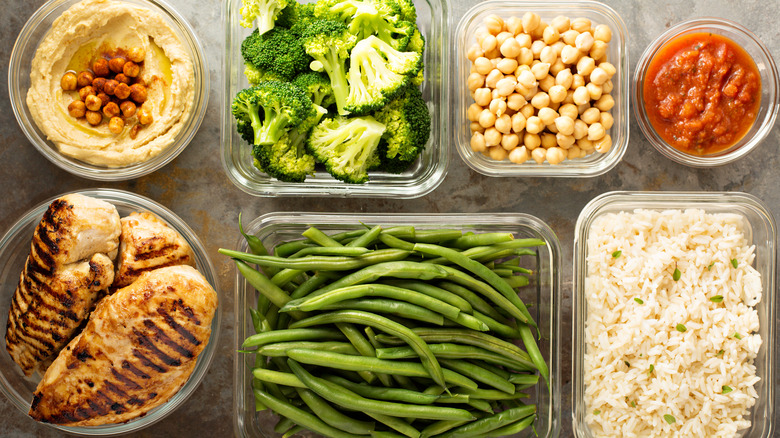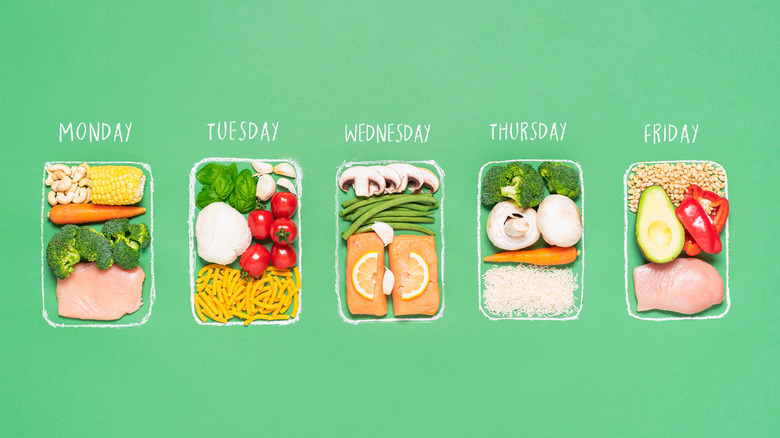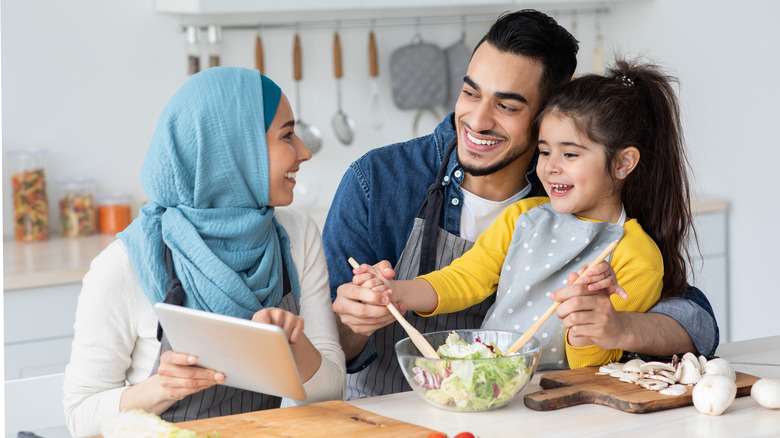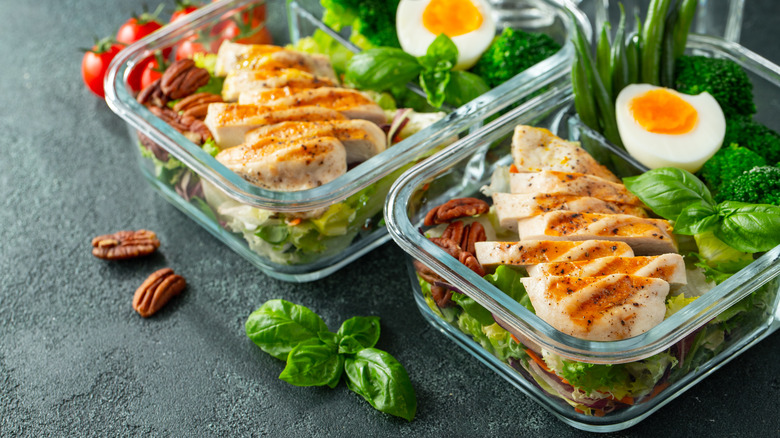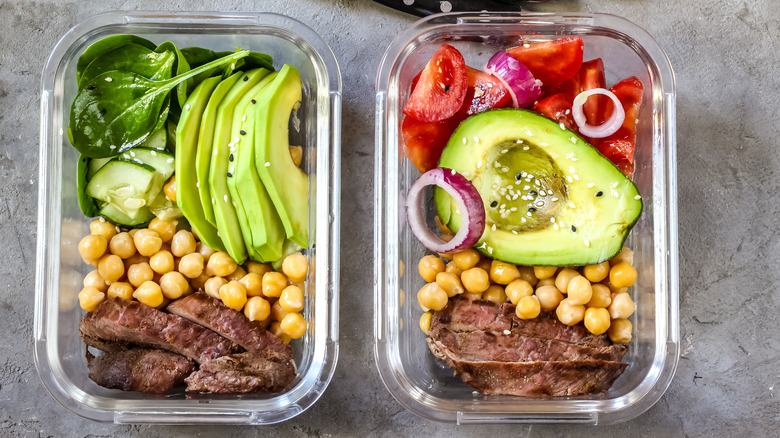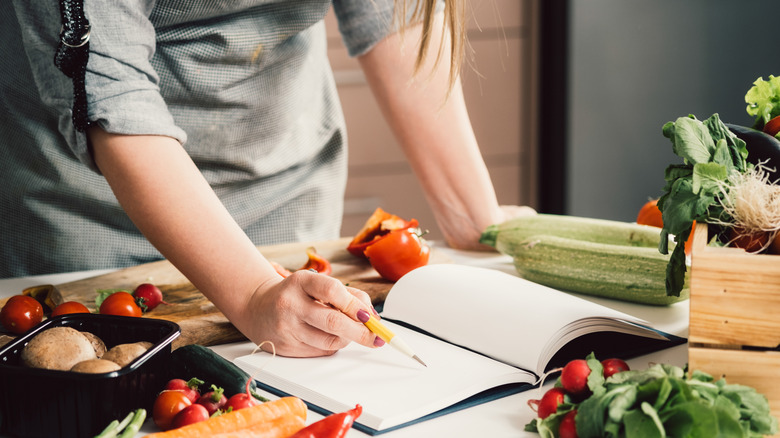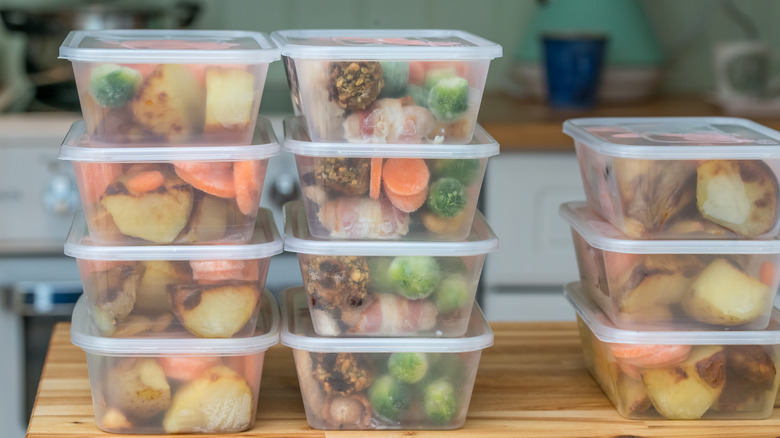The 11 Biggest Mistakes You're Making With Meal Prepping
It's the end of a long work day, and you're too exhausted to cook. So what do you do? Order a pizza? Microwave a bag of popcorn? Skip dinner and go straight to bed? It's a horrible situation to find yourself in, both for your stomach and your overall health and well-being. If you find yourself in this situation often, meal-prepping could be exactly what you need in your life. By taking a little time once or twice a week to plan, shop, prepare, and portion meals, you'll never be without something tasty and nutritious to put in your tummy at the end of a long day.
Other benefits of meal-prepping include weight loss, as it's easier to avoid food cravings and stick to a healthy, calorie-controlled diet when you plan ahead (via Harvard T.H. Chan School of Public Health). You can also save money by meal prepping because you can buy in bulk or when food items go on sale. The truth is that becoming a master meal-prepper takes some practice and is not without its challenges and pitfalls. To prepare yourself, peruse these common mistakes people make when meal-prepping so you know what to avoid before you get started.
1. You're not starting small
If you're just getting started with meal-prepping, don't bite off more than you can chew. The end result can leave you with nothing to eat. Trying to tackle the task of prepping all 21 meals of the week is bound to backfire, leaving you overwhelmed, frustrated, and burnt out. Keep it simple when you're starting out and either choose to prep three meals for your busiest day of the week — the day you have a lot of meetings or have to shuttle the kids between various activities (via Good Housekeeping). Or choose the one meal — breakfast, lunch, or dinner — that you struggle the most to get on the table each day.
You have to take into account that when you're a newbie, everything is going to take you longer. But once you develop a system and increase your efficiency, you'll be able to do more in less time. Once you accomplish prepping food for your busiest day or "problem meal," then you can add on from there. And who knows where you can go from there. Soon enough, 21 meals a week + snacks + plus healthy desserts could become a breeze.
2. You're not having set meal prep days
Meal prepping is all about organization. If you don't set aside a specific day of each week for the planning, shopping, and cooking, and mark it on your calendar just like any important event, it's likely to get pushed to the wayside when other things come up. It's crucial to form a meal-planning routine and stick to it each week as much as possible (via Healthline).
Determine what day of the week is normally your least in-demand — with work, family, and social obligations. For many people, this is the weekend, either Saturday or Sunday. It's typically best to start in the morning and get it out of the way, so you can enjoy the rest of your day. How many hours you'll need to set aside depends on how many meals you're prepping, the complexity of the meals you choose, how organized you are in your tasks, and how efficient you are with your time-management. Remember that meal-prepping is a habit and a skill, and mastery comes with time.
Although it's common meal-prepping practice to do all your prep — planning, shopping, and preparing — on the same day, you don't have to. You could sit down and plan your meals on Thursday night, hit the grocery store on Friday after work, and then do your cooking and packing on Saturday. Find the rhythm that works best for you and one that you can stick with each week.
3. You're only having one meal prep day
If you're prepping a lot of meals, one meal prep day may not be enough. This is especially true if you are making fresh, not frozen, meals. According to the Mayo Clinic, fresh foods can safely be kept for up to four days in the refrigerator. That means that the stew you made on Sunday isn't going to make it to Friday, unless you freeze it, which can extend its life indefinitely — although frozen foods typically taste better when they're thawed and consumed within four months.
Therefore, if you're prepping a whole week's worth of food you have two options: Have one prep day per week, and make fresh food for the first three or four days and freeze your meals for the rest of the week. Alternatively, you can split your week and have two prep days, for example, Sunday and Thursday. This will allow you to have fresh food all week long, and it might make food prep days feel not quite so overwhelming because you don't have to prepare everything in a single day.
However, make no mistake, there's nothing wrong with frozen meals that are ready to be popped in the microwave. Frozen food is just as healthy as fresh food, with produce and meats holding their nutritional value through the freezing process (via Winchester Hospital). Just keep in mind there's a right way and a wrong way to freeze and defrost foods.
4. You're not prepping enough or are prepping too much
Meal-prepping isn't a science, and it takes some trial and error to get it just right. One big mistake that a lot of newbies make is not getting the portions right. If you make too much, you're going to have food waste. You might not know this, but food waste is a huge problem in home kitchens. In fact, according to FoodPrint, home kitchens are responsible for the largest share of food waste, amounting to 40 to 50 percent and about 238 pounds of wasted food per person each year. Over-buying, over-prepping, and lack of planning are the main culprits.
Much less common but still possible is making too little food. When this happens, you'll find yourself hungry and scrambling for something more to eat.
Planning ahead can solve these problems. Make your list carefully prior to going to the store so that you know exactly what you need to buy. This crucial step will help you skip impulse buys, while ensuring you have everything you need. Cooking from recipes that include specifics on portion sizes and nutritional info can help you guarantee that you're making enough food, but not too much where there's waste. You can also familiarize yourself with common serving sizes of foods (via National Institute of Diabetes and Digestive and Kidney Diseases), or use a food portion calculator for more exact measurements based on age (via Love Food Hate Waste).
5. You're not keeping it simple
Meal prepping is all about convenience and saving time. In order to get the most bang for your buck, keep it simple. Don't choose time-sucking, complex recipes. Save those for days when you have enough time to cook a meal from scratch and put it on the table hot and fresh. Stick to recipes you already know and love and are familiar with cooking. Keep ingredients to a minimum, and don't make any recipes containing ingredients you have to chase around town.
One easy meal prep idea that can be executed in a multitude of ways is to pair a protein with whole grains and veggies. For example, marinated, grilled chicken breast with wild rice and sauteed asparagus, or a salmon filet with quinoa and roasted vegetables. Easy peasy.
One-pot meals are also great candidates for meal prep. Ideas include chicken and vegetable stir fry, chicken noodle soup with lots of veggies, and African sweet potato stew.
6. You're not making it a family affair
Meal prep is only successful if everyone wants to eat what's on the menu. If the kids don't like the quinoa salad you made, they're going to reach for a frozen pizza and you're going to be left with extras. They're also not going to get the nutrition they need. It's important that you get the kids involved in choosing meals, shopping, and prepping. Not only does this ensure that they like — and will eat — the week's meals, but you'll also get some help and save some time. If you're like most busy moms, you barely have time to take a shower much less cook meals for an entire week. Finally, it's a great way to spend more time with your kids and teach them important skills about organization, planning, budgeting, and cooking — and cleaning up!
If you get push back, which you probably will, giving kids ownership and autonomy can help. While you oversee, try to give them the reigns. For instance, let them pick one or two of the week's meals. EatLove recommends introducing the idea of meal prep with engaging questions. For example, ask them about their favorite foods, like if they could only eat one food for the rest of their life, what would it be? If that's pizza, suggest you make a homemade version with the ingredients of their choice. Be sure to encourage the inclusion of healthy ingredients like veggies and the exclusion of less healthy foods like pepperoni.
7. You're not planning enough variety
If you're eating the same things on repeat with no variety, your meal-prepping journey isn't going to last long. In particular, if you're meal planning for health and/or weight loss, you're only going to want to stick with your plan if you're feeling satisfied. Delicious meals with variety will also help you avoid giving into food cravings (via Scripps). Grilled chicken breast, broccoli, and brown rice is a delicious and healthy meal, but if you try to eat that every day it's going to get old fast.
So what does variety look like? An example is having a pasta dish one night, a fish dish the next night, a tuna sandwich for lunch one day, and a pita with falafel and veggies the day after. Breakfasts could include an omelette one day and oatmeal with fruit the next and so on.
Don't forget dessert! You can make ahead healthy desserts that taste delicious but don't break the calorie bank. Some tips include using whole-grain flours in baked goods, including lots of fruit, and subbing out some of the regular butter, which is high in saturated fat, for almond paste, peanut butter, or yogurt.
8. You're not planning nutritionally balanced meals
Variety is also important to make sure you're covering all your nutritional needs — getting the macronutrients and micronutrients required for overall health and well-being. These include vitamins and minerals, protein, fats, and carbohydrates, including fiber. Harvard T.H Chan School of Public Health recommends using a healthy eating plate visual to plan your meals. A balanced meal is comprised of one-fourth whole grains, like brown rice or quinoa; one-fourth protein, such as a filet of fish or chicken breast; and the remaining half of your plate is filled with fruits and vegetables. You also need to include healthy fats, such as olive oil, in moderation.
Meal-prepping and planning ahead doesn't mean you can't indulge in your favorite comfort foods, like pizza and pasta. But you should try to make healthier, more nutritious choices. For example, on pizza night, try using whole-grain or cauliflower crust and a little less cheese. Top it with lots of veggies instead of processed meats like ham and pepperoni. Choose whole-grain pasta over refined grain versions, because it's higher in nutrients and dietary fiber, which you need for digestive and heart health (via Mayo Clinic). Be sure to watch how much sodium you add to your meals and avoid added sugar.
9. You're not keeping a recipe collection
No one has the time to search for new recipes each week, in addition to doing the shopping and cooking. At the beginning of each month, invest a little extra time in researching, collecting, and organizing a collection of easy recipes. Start broad, by writing down some of your favorite recipes you already know and love. Then brainstorm some favorite categories of foods, such as Mexican and Italian, as well as some of your family's favorite foods (via KLT Meal Planning Solutions). This is a great time to get the family involved. Next browse some cookbooks or cooking sites on the Internet for recipes that pique your interest and don't take too long to prepare.
Once you have your stock of recipes, organize them in a rotation. You can do this either in a physical or electronic rotating card file, or by organizing them on a monthly calendar. Think about how many times a month you would realistically want to eat each meal. Also make sure to organize them for variety, i.e., alternating your proteins and grains. Each time you make a recipe, take notes on how each meal turned out and what changes you would make next time. Any recipes that weren't a hit can be discarded.
10. You're not using the right containers
Planning, shopping, and cooking are only part of the meal-prep process. Packing and storing are also equally important tasks. You can significantly decrease the frustration and increase the efficiency of this part of meal-prepping by using the right containers. The best meal prep containers are durable, spill and leakproof, and easy to clean. For freezing foods, containers should be resistant to moisture vapor; not become brittle and crack under cold temperatures; oil, water, and grease-resistant (via Michigan State University). They should also do a good job at protecting food from absorbing bad odors and flavors, along with being easy to seal and label.
If you know you are signing on to meal-prepping for the long term, an investment in high-quality containers is well worth it. If you choose the cheap flimsy kind, just know that you will have to replace them much more often. Additionally, it's important to note that they may not do as good a job at protecting your foods.
If you have space constraints in your fridge or freezer, choosing containers that are the right size for the meals you prepare is key. Don't choose containers that are too big for what you're storing. If you're freezing foods, too much air in your containers can lead to freezer burn (via Fred's Appliance). You might be able to save space by packing some items in storage or freezer bags and other items in hard-sided containers.
11. You're not allowing enough time for meal prep
The time you need to plan, shop, cook, and package your meals will vary, and it will definitely take longer when you're first starting out. You absolutely must leave enough time for yourself to complete each task. If you start cooking too late in the day, you'll find yourself scrambling to pack foods at midnight when you should be sleeping. The idea of meal-prepping is to reduce your stress level during the week, not add to it. If you're doing it all in one day, start in the morning whenever possible. That way when you're done, you'll have the rest of the day to relax.
When it comes to cooking, organize your tasks with those that take the longest first (via Harvard T.H. Chan School of Public Health). For example, start with cooking beans, grains, proteins, and roasted vegetables. While those are cooking, you can be tackling other prep tasks, or cleaning up. You can also increase your efficiency in the kitchen by practicing "mis en place." In French, this means having all your ingredients prepared and ready to go before you begin cooking (via UNL Food). For example, start by doing all your chopping, slicing, grating, and measuring. Mis en place also includes getting your cooking equipment set out — pots pans, bowls, etc. And don't forget to clean as you go along. This will enable you to have clean workspace when you start packing, and you can get out of the kitchen sooner.
